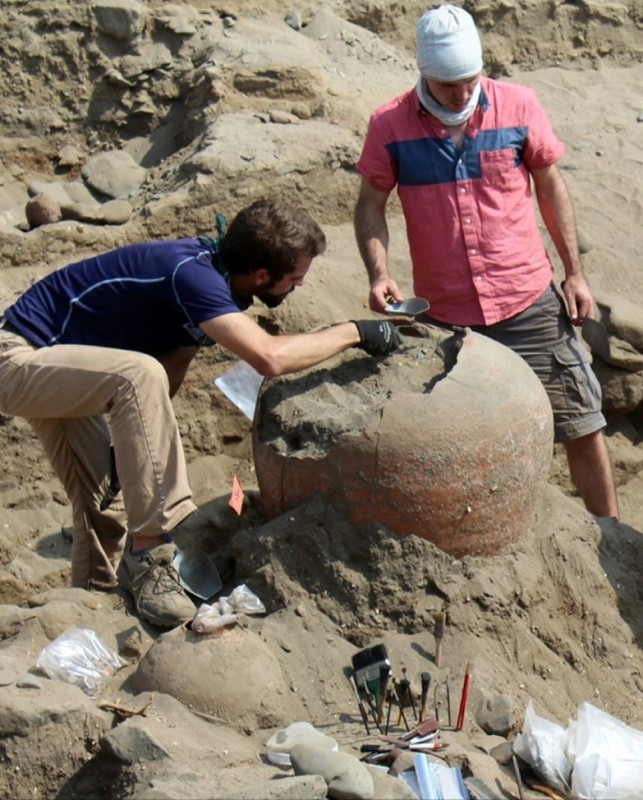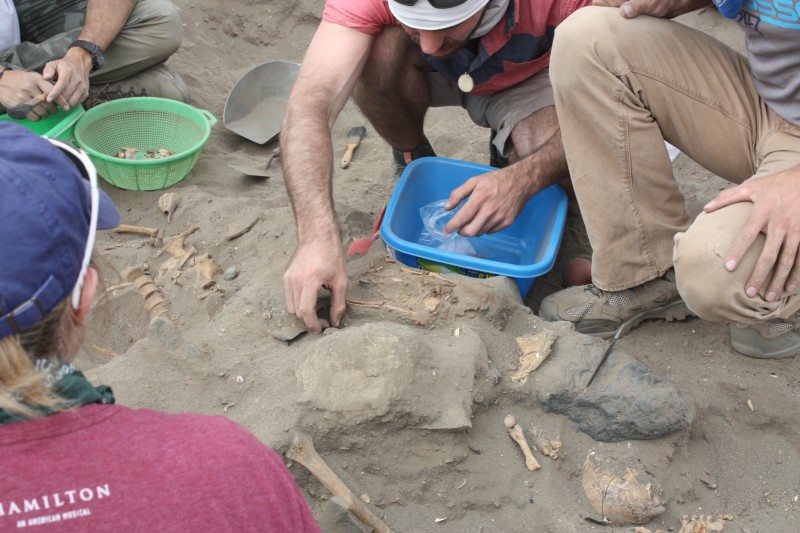Fieldwork
This listing expired on May 31, 2018. Please contact celeste.gagnon@wagner.edu for any updated information.


Location: Huanchaco, LD, PE
Season: June 21, 2018 to July 25, 2018
Deadline Type: Rolling
Website: http://savethemoche.org/index/field-school/
Program Type:
Field school
RPA Certified:
no
Affiliation:
University of North Carolina, Chapel Hill & MOCHE Inc.
Project Director:
Brian Billman, Celeste Gagnon & Gabriel Prieto
Project Description:
This program is a 5-week field school in archaeology and bioarchaeology on the north coast of Peru. Through excavation, analysis of human remains, and visits to archaeological sites, students learn how to conduct archaeological and bioarchaeological research as well as learn about ancient and contemporary Peru.
This course provides students with training and experience in archaeological excavation and the analysis of human remains and artifacts. In addition, students learn about the history and prehistory of Peru. The program begins with workshops on the culture history of the region, the research project, and research methods, after which students work in the field and lab. Students will work at Jose Olaya, a fishing village dating to BC 200 to AD 200. The site is located on the grounds of a high school in Huanchaco. It has well-preserved households, tombs, and trash middens, containing pottery, basketry, textiles, metal objects, and stone, bone, and wood tools. Organic remains, such as bone, shell, and plant remains, are abundant and well preserved because of the dry climate.
The program also includes educational tours of world-famous archaeological sites on Saturdays and ends with a 3-day tour of Cajamarca, high in the Andes Mountains of Peru.
Through excavation, lab analysis, readings, and discussions, students learn how archaeologists and bioarchaeologists study social status, class, and economic relationships.
The program has two options for students
(1) Primary Focus on Excavation and Artifact Analysis: Students will learn how to excavate prehistoric households and burials and how to analyze artifacts from their excavations. After the initial workshops, students work 5-days a week excavating human burials and households at the site of Jose Olaya and analyzing artifacts from the excavations. This option includes a workshop on the analysis of human remains. Enrollment is limited to 12 students.
(2) Primary Focus on Bioarchaeology: Students will learn how to excavate and analyze human remains. After the initial workshops, students will excavate several burials at the site of Jose Olaya. Then students will work 5-days a week in the lab, studying human remains recovered from their excavations. Enrollment is limited to 6 students. This option includes a workshop on household archaeology.
Period(s) of Occupation: Early Intermediate Period (BC 200 to AD 200)
Project Size: 1-24 participants
Minimum Length of Stay for Volunteers: 5 weeks
Minimum Age: 18
Experience Required: none
Room and Board Arrangements:
Students stay in double or triple rooms with private baths at a hostel one blocks from the beach in Huanchaco. The hostel has free Wi-Fi and hot showers. The program provides 3 meals a day, 6-days a week for students and faculty. Meals are prepared and serviced at the hostel by local women. Vegetarian meals are available, but we can’t provide vegan meals. The women prepare excellent traditional north coast Peruvian meals. Cost: credit - $4300 non-credit - $3600
Academic Credit:
non-credit or 6 credit options credits offered by UNC-Chapel Hill. Tuition is credit - $4300 non-credit - $3600.
Celeste Marie Gagnon
1 Campus Rd
Staten Island
NY
10301
USA
Phone: 718-390-3126
Fax: 718-420-4158
The AIA is North America's largest and oldest nonprofit organization dedicated to archaeology. The Institute advances awareness, education, fieldwork, preservation, publication, and research of archaeological sites and cultural heritage throughout the world. Your contribution makes a difference.
Notifications